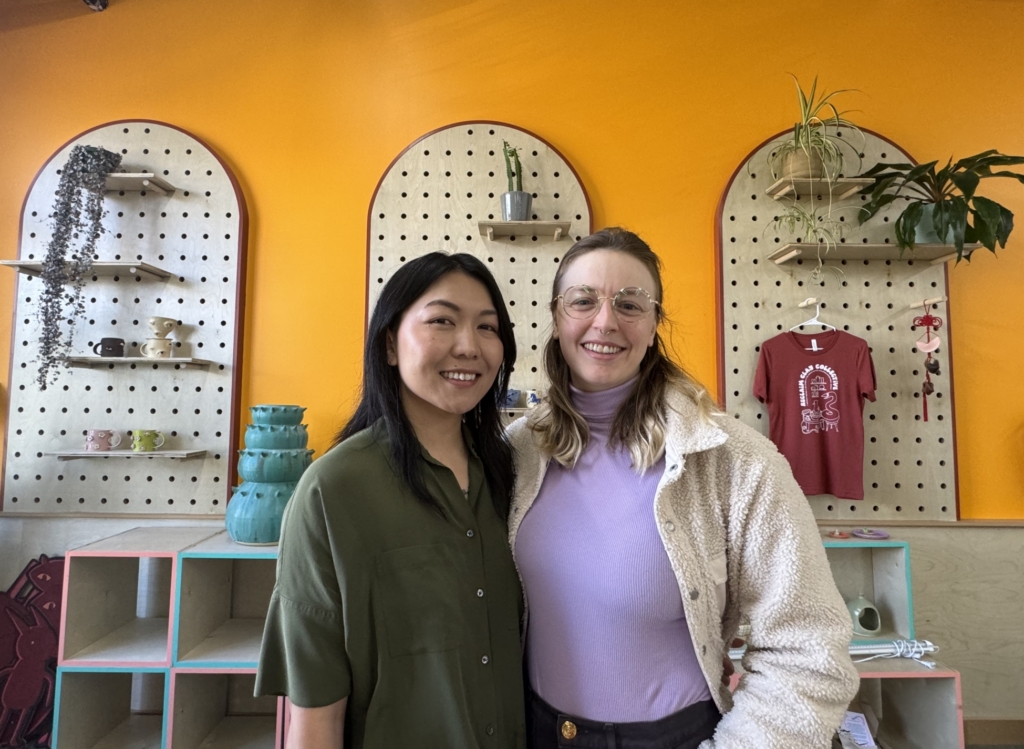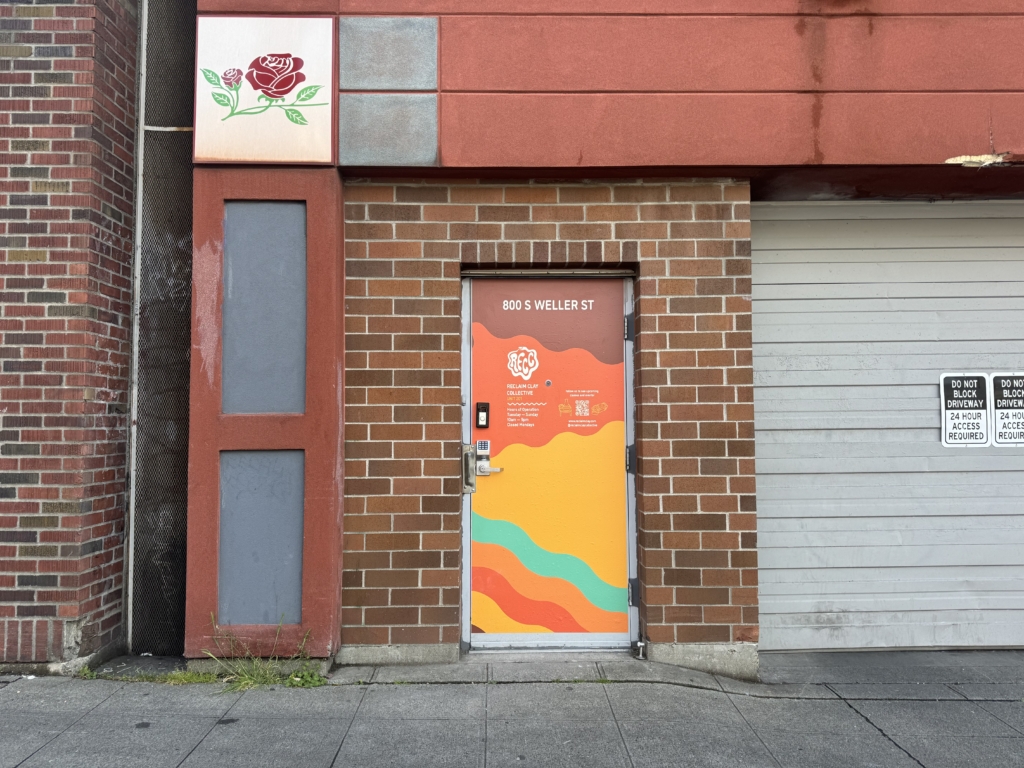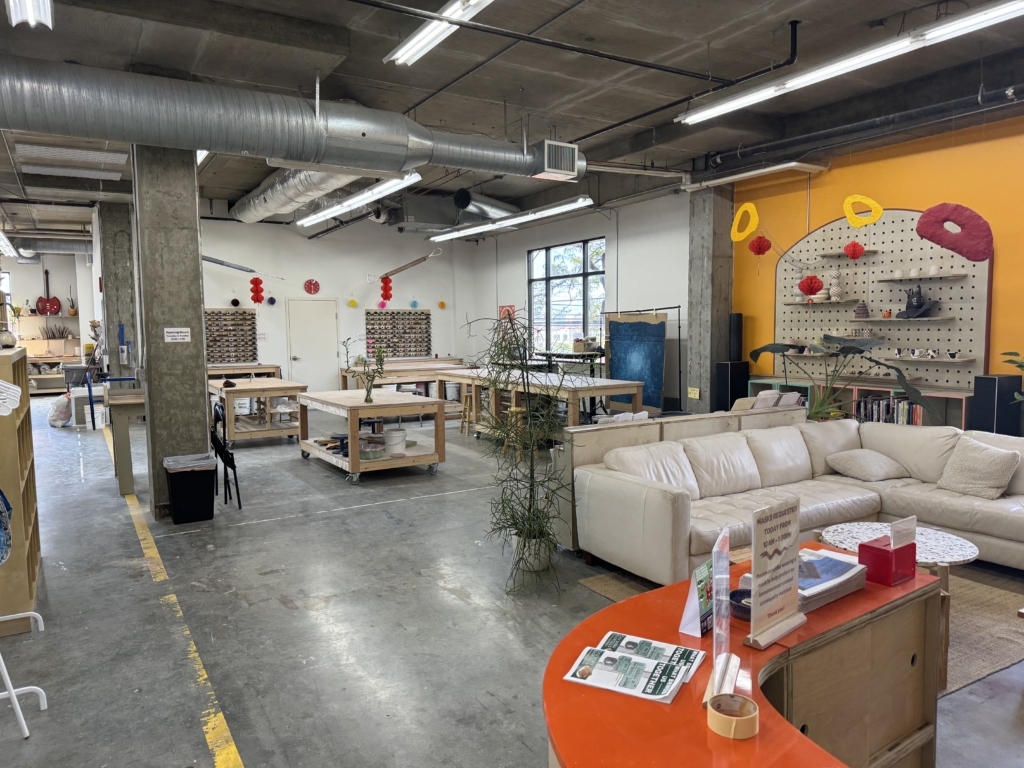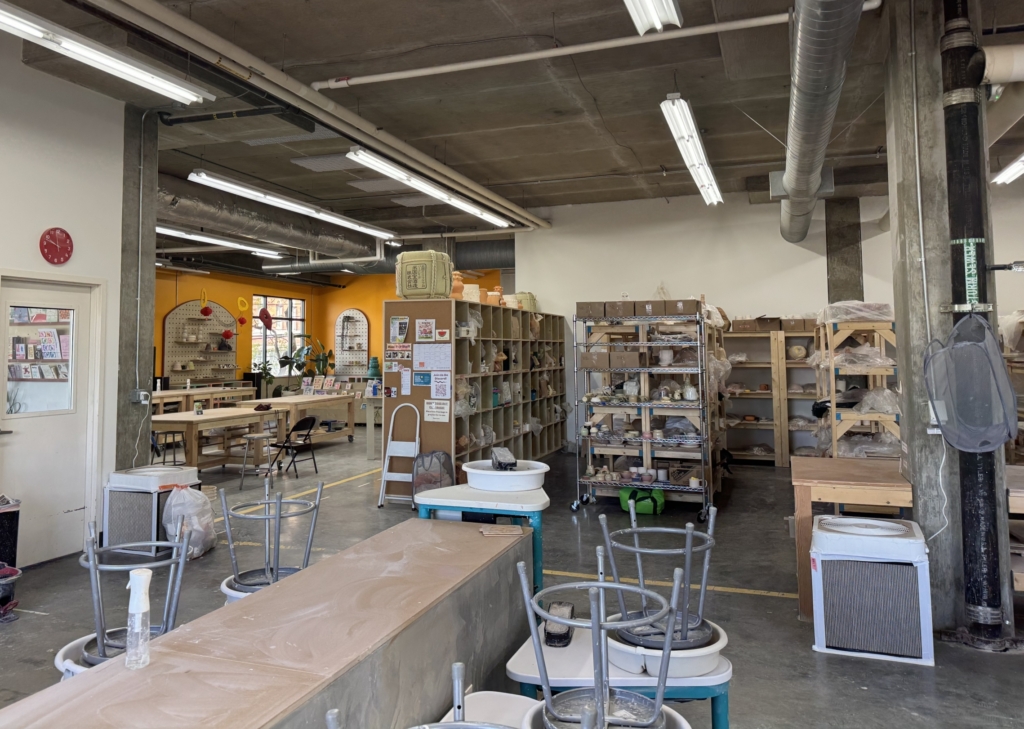
Meet Siera Matsuo and Luanne Wilson, owners of Reclaim Clay Collective – a POC, queer, women-owned pottery and arts studio located in the Chinatown-International District (C-ID) in Seattle.
Reclaim Clay Collective is a creative arts space that offers classes, workshops, and memberships for pottery and other art mediums like risograph printing, knot-tying, flower arranging, and more.
Learn more about Siera and Luanne and their and their beautiful, community-centered studio in the heart of the C-ID!
This interview has been edited for length and clarity.
Tell us about the location of Reclaim Clay Collective and why you chose to build your business in the Chinatown-International District (C-ID).
Reclaim Clay Collective is located on the corner of 8th and Weller in the old Tuse Chong fortune cookie and noodle factory.
We chose to open our brick and mortar in the C-ID because we wanted to be in a centralized location, and we were looking for a space in a diverse neighborhood.
A lot of the pottery studios in Seattle aren’t necessarily located in diverse neighborhoods or aren’t easily accessible by public transit – so it can be a little bit harder to access those locations. Even though they’re lovely spaces, we wanted to create a space that created accessibility for those communities.

How long has Reclaim Clay Collective been around?
We’re about to have our one-year anniversary, so we’ve been in operation for approximately one year, although the journey to get here was more like four or five years.
Could you share a ittle bit about your journeys as artists and how you found pottery or other art forms in your journey?
Siera: I majored in microbiology, and I originally moved here from Oahu, Hawaii to work in the biotech industry. I had dabbled in art my whole life – but I was going to grad school and it was very stressful, so I took a pottery class.
My dad does watercolor paintings and I used to paint, but I had never done pottery, so I found a workshop and I just loved the tactile nature of it. It really helped me to be present and in the moment.
Luanne: I majored in integrative biology and I had a focus on ecology and animal behavior and so I actually worked at two institutional museums, the Museum of Vertebrate Zoology at UC Berkeley and then the Burke Museum here at University of Washington.
I originally was working in labs at Berkeley and then didn’t like it at all and then shifted my path towards education. I worked in education outreach at the Burke Museum, doing, basically synthesizing what researchers are doing and translating it for public engagement, and that was really fun, but working in institutions is really stressful and I got very tired and that entire career path.
I was doing art as a hobby on the side, doing freelance things like design, art, and had done pottery a couple times in my life, but I ended up leaving the Burke Museum and took on pottery as a recovery phase. That’s how I met Siera, and I just got really deeply into it.
I was like, “I’ve done science my whole life, and maybe this is time for my art phase”.

This is a large and beautiful space with a lot going on. When you were designing the space, what were some of the features you wanted to include?
Siera: It was really important for me to have an open layout. I wanted to be able to see every part of the studio.
The natural light in here is amazing, and that is great for the art that we do in here. Everything in the space also is modular, so we can move things around and create different layouts, so we can host multiple types of events.
This building used to be a home to the Tuse Chong fortune cookie and noodle factory, and it’s very special to me because back in Hawaii, my grandpa owned a noodle factory and we made saimin. We wanted to take a little bit of the history, so we made a fortune cookie test tile wall of all the different glaze combinations our studio offers.
Most recently, we built out the lobby area because we wanted the space to be where members can sell their wares and showcase their work.
Luanne: We also wanted this to be a multimedia space, so while about 80% is the pottery space in our big open floor plan area, we also have one doored room, which is our “clay-free zone” where we do all of our print shop work. We have two risograph printers and we host risograph classes. Risograph is a print style very similar to silk screening. We have two machines that look like large copy machines. It’s like a giant copy machine that creates a screen of your artwork and puts it on an ink drum, and then makes copies – similar to a screen press.

What are you most proud of at Reclaim Clay Collective?
We’re most proud of the community that we’ve built. Everyone here has been so caring and supportive. Our neighbors at the ACRS Food Bank are constantly checking in on us and they’ve just been so nice – they give us fruit, they give us snacks. All the local businesses in the C-ID have been really supportive. Everyone was really excited when we opened.
Then the community in our studio itself – everyone is really active. All of our members get really inspired to create community activities. We have a book club, we have a mending circle group that meets here, we have a Mahjong night that started gathering.
A lot of our community members are active outside of this space – volunteering and in activist groups of their own. It’s really inspiring to see how that interplays and how people have really built friendships here.
New members come in and everyone will be like, “Oh hi, are you a new member? My name is ______, and here’s what I’m working on, and you should come to this event that we’re doing!”
Why do you think it’s important for people to spend like it matters, and support small businesses?
Luanne: It’s so important for people to spend like it matters because it is hard to find support as a small business owner. Our dollars are how we vote, and making a purchase from a small business is the highest compliment you can give them. It’s telling them that you value their work and that you want to share it with your friends and loved ones, and that’s a huge compliment.
If you met somebody who wanted to start a small business in Seattle, what piece of advice would you give them?
Siera: Don’t be afraid to ask for help. Put your desires out there into the world. The ball didn’t really start rolling for us until we started telling people about the studio and our intentions.
Business Impact Northwest helped us with our business planning and also the business librarians at the Seattle Public Library – we didn’t know that business librarians were a thing!
The Chinatown-International District Business Improvement Area helped us in finding the space.
Contact the local support systems for the areas that you’re trying to create a business. They are very helpful in giving advice and just being all-around supportive!

What are some businesses in the neighborhood that you like to support?
- Phin (Siera: “I love their salted lime soda!”)
- Little Saigon Creative
- A Resting Place on King Street is a really nice spot if you’re dealing with grief.
- Wing Luke, of course. We have partnered with them to create a couple of classes.
- Phnom Penh for noodles.
